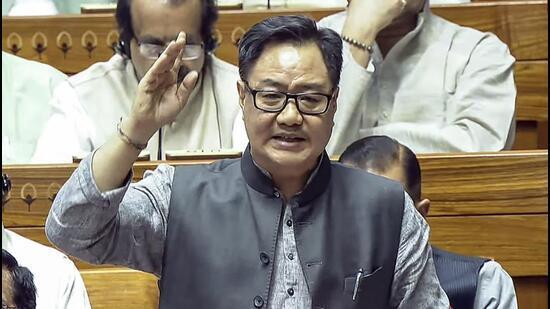
Opposition Creates Confusion & Leaves House: Rijiju in Rajya Sabha
The Indian parliament is known for its high-stakes debates and strong opinions. Recently, a heated discussion took place in the Rajya Sabha, the upper house of the Indian parliament, over the Waqf (Amendment) Bill. The debate was marked by strong words and accusations from various members, including Union Minister Kiren Rijiju. In a surprising turn of events, Rijiju, a senior BJP leader, criticized senior Rajya Sabha members for creating confusion and raising issues in the House but not staying back to listen to the replies.
The debate was sparked when MP Kapil Sibal, a senior lawyer and Congress leader, compared the properties of Waqf bodies with those of other religious bodies. Rijiju took exception to this comparison, claiming that it was an attempt to create confusion and mislead the House. He accused Sibal of not staying back to listen to the replies and instead leaving the House, which he believed was unfair.
Rijiju’s outburst was in response to Sibal’s comments that the Waqf properties were not being utilized properly and that the government was trying to take control of these assets. Sibal’s remarks were seen as a attempt to highlight the alleged mismanagement of Waqf properties and the need for greater transparency and accountability.
However, Rijiju disagreed with Sibal’s assessment, stating that the Waqf properties were being utilized for the betterment of the Muslim community and that the government was committed to protecting and preserving these assets. He accused Sibal of creating confusion and trying to mislead the House by comparing Waqf properties with those of other religious bodies.
Rijiju’s criticism of Sibal was not limited to his remarks on Waqf properties. He also accused Sibal of not staying back to listen to the replies and instead leaving the House, which he believed was unfair. Rijiju claimed that this was a common practice among senior members of the opposition, who would raise issues in the House but not stay back to listen to the replies.
This behavior, Rijiju believed, was not only unfair but also created confusion and disrupted the functioning of the House. He emphasized that it was the responsibility of all members of the House to engage in constructive and respectful debates, and that leaving the House without listening to the replies was not a responsible behavior.
Rijiju’s criticism of Sibal and the opposition was met with strong reactions from other members of the House. Many members of the opposition, including Sibal, defended their actions and accused Rijiju of being biased and trying to suppress their voices.
The debate over the Waqf (Amendment) Bill highlighted the deep divisions that exist in the Indian parliament. The bill, which aims to amend the Waqf Act of 1995, has been criticized by many members of the opposition, who claim that it is an attempt to take control of Waqf properties and undermine the autonomy of the Waqf bodies.
Despite the controversy surrounding the bill, Rijiju’s criticism of Sibal and the opposition highlights the need for more constructive and respectful debates in the Indian parliament. The House should be a place where members engage in healthy discussions and debates, and where all voices are heard and respected.
In conclusion, the debate over the Waqf (Amendment) Bill in the Rajya Sabha was marked by strong words and accusations from various members, including Union Minister Kiren Rijiju. Rijiju’s criticism of senior Rajya Sabha members for creating confusion and raising issues in the House but not staying back to listen to the replies highlights the need for more constructive and respectful debates in the Indian parliament.






